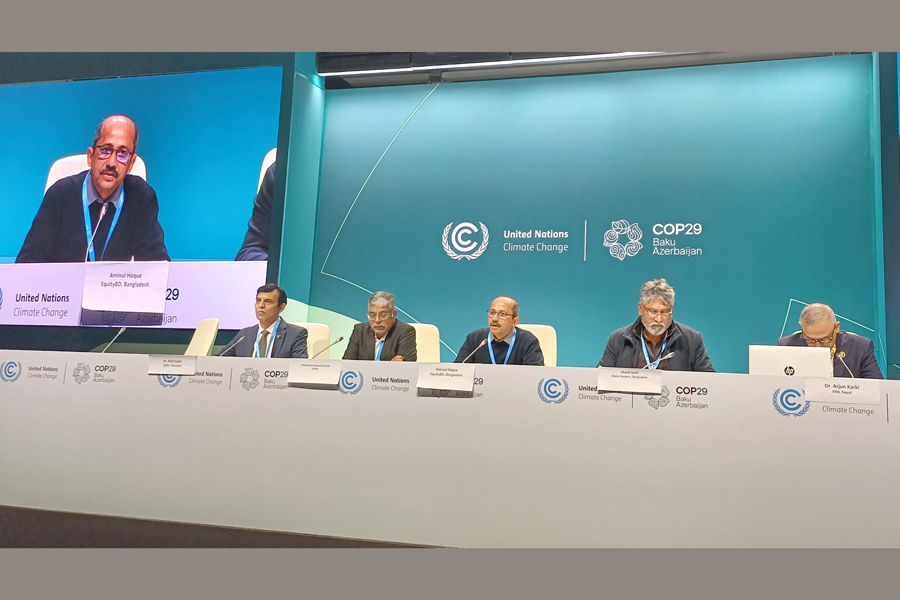
Published :
Updated :

From the ongoing COP29 Global Climate Conference in Baku, leaders of South Asian civil society on Friday gathered in a press conference and demanded a clear framework and structure on NCQG [New Collective and Quantified Goal on Finance] based on the equity and justice as enshrined in Article 9.1 of Paris Agreement [PA]. They also advised the developed countries not to leave Baku [Conference Centre] without giving a concrete and measurable financial declaration and finalising the framework at COP29.
The press conference, titled "LDC’s & MVC Peoples’ Expectations and CoP 29," took place at the COP 29 climate conference centre in Baku. Representatives from various Civil Society Organisations (CSOs) including Mr Shailendra Yashwant Kharat from CANSA [Climate Action Network, South Asia], India, Dr Abid Suleri, Executive Director, SDPI-Pakistan, Dr Arjun Karki, Nepal, and Mr Sharif Jamil from Bangladesh along with many others participated and shared the issues. The event was moderated by Aminul Hoque from EquityBD, Bangladesh, according to a press release.
In moderation, Aminul Hoque criticised the developed countries, and their ally, COP presidency, failed explicitly in making a clear statement for the transition away from fossil fuels and this condition was removed from the final draft text under pressure from big emitters. Secondly, they also deceived and showed contempt towards the LDCs, MVCs and developing countries by giving an obscure framework without ensuring a measurable and meaningful financial support for NCQG. Developed countries kept all the LDCs and MVCs issues under the “bracket” and “options” in the draft decision text, which is against the principle of equity and justice he criticised. He demanded a promised from big emitters to produce new NDCs in line with limiting warming to 1.5C ahead the year 2025 and a measurable declaration containing USD $1.3 trillion per year as minimum financial need for fighting climate crisis.
Shailendra accused developed leaders of making a ‘stark failure’ in showing respect for the Paris Agreement and insulting the global north with a ‘No Deal’ agreement. He said their rehashed rhetoric offers no support for COP29 negotiations. “We are seeing a deadlock due to many more contradictory issues like ‘investment opportunity’, ‘partnership’ and ‘enhance domestic resource mobilisation’ in the negotiation shifting all responsibilities to developing countries, he said. “There are no more excuses for global north in Baku. As we are heading in the edge of negotiation of COP-29, against all odds, developed countries must be ambitious and deliver the required climate finance of $1.3 trillion based on the article 9.1 of the PA to enable climate action for the developing world while upholding justice.”
Dr Abid Suleri said there has been hardly any output on mitigation ambition and its related work programmes with attemps to impose conditions in the name of setting targets and forceful carbon trading options etc in the draft text. These, he argued, will undermine their demands and place countries in a vicious circle of ‘debt trap’. HE called for a clear definition of vulnerability and proposed inviting and engaging the IPCC experts [Intergovernmental Panel on Climate Change] to ensure alignment with the 1.5-degree goal and its related work, including the revision of NDCs and subsequent global stocktakes ahead COP-30.
Sharif Jamil said, “We are very tired and impatient and outright reject this meaningless deal. COP29 is going to end without any significant pledge for vulnerable and displaced people, and reparations, which is unacceptable. We demand adequate finance through reparations and compensations, along with non-debt instruments.”
Mr Arjun Karki expressed concern that negotiations on the Global Goal on Adaptation (GGA) were also stalled due to the unwillingness of developed countries to provide finance, as well as a lack of clarity on indicators for measuring progress.
“Adaptation is the lifeline of MVCs, and we are worried about how to close the huge gap between adaptation funding and needs,” he said, calling on developed countries to “triple, not double,” adaptation funding by 2025.


 For all latest news, follow The Financial Express Google News channel.
For all latest news, follow The Financial Express Google News channel.